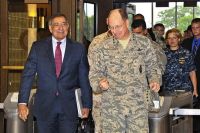WASHINGTON, Aug. 5, 2011 — Defense Secretary Leon E. Panetta today spoke to service members about national security concerns and the defense budget during a visit to U.S. Strategic Command headquarters at Offutt Air Force Base, Neb.
“It’s a challenging time for the United States,” Panetta said. “But with regard to our missions, they really do relate to making sure that we secure this country for our children. We’ve got a number of challenges and threats that are out there that we are responsible for confronting.”
The defense secretary talked to the troops about progress made since the Sept. 11, 2001, terrorist attacks on the United States.
“We have confronted terrorists since 9/11, and even before that,” he said. “Since 9/11, we’ve been going after al-Qaida. And we have made progress in weakening al-Qaida.”
U.S. forces have conducted operations against the terror organization in Pakistan, Afghanistan and other parts of the world, Panetta said. “But in particular,” he added, “we have seriously weakened the ability of al-Qaida to plan attacks on this country.”
Panetta said the most significant achievement thus far in the fight against terrorism was finding al-Qaida leader Osama bin Laden.
“That was, for me, probably one of the proudest moments I’ve had, with the ability to get the intelligence on where we thought he might be located, but then to work with the military to develop the plans to actually go after him,” said Panetta, who was CIA director when bin Laden was killed in Pakistan. “This was really a tremendous example of the intelligence community and the military community working as a team to accomplish a very important mission: to try to rid the world of this criminal. And we were successful at that.”
That helped to continue the effort to weaken al-Qaida, he added. “[But it] doesn’t mean that they’re gone,” he said. “They’re still around, and there are elements of al-Qaida that are still out there whose main purpose is to attack our homeland.”
The defense secretary emphasized keeping pressure on the terrorist network no matter where they hide.
“We’ve got to continue to put pressure on them in Pakistan. … The biggest concerns we have now are the nodes where they’re located in places like Yemen, Somalia, North Africa,” he said. “We’ve got to continue to put pressure on them, and we will do that. We will do that because our goal is to make sure that someday we can secure the world from the threat of that type of al-Qaida terror.”
Panetta also discussed other issues he said could affect U.S. security interests.
“We’re confronting the problem of rogue nations today – nations like North Korea [and] Iran, who continue to seek a nuclear capability,” he said. “And because they are rogue nations, they remain dangerous in terms of the threat to the rest of the world. So we have to continue to focus on that threat as well.”
Panetta reminded troops that attacks are not just limited to places and people, but also can be mounted against critical infrastructure.
“We have to continue to focus on the threat of cyber attacks,” the secretary said. “We’re now in a very different world, where we could face a cyber attack that could be the equivalent of Pearl Harbor. Someone using cyber can take down our power grid system, our financial systems in this country, our government systems [and] our banking systems.
“They could virtually paralyze this country,” he continued. “We have to be prepared to deal with that. We have to have both a good offense and a good defense with regards to the cyber world.”
Panetta noted that Stratcom members work to improve U.S. abilities to confront cyber attacks, and he reaffirmed his commitment to ensuring the U.S. military remains fully mission-capable and that service members and their families get the support they need.
“That’s very important to me,” he said, “because frankly, we can’t defend this country unless we have good people that are willing to take on that job. And for that to happen, you have to know that we are behind you 100 percent. So I want you to know that as you go out and fight the wars you have to fight, I will have to fight the wars that I have to fight in Washington to make sure that we protect your back. And you have my guarantee that I will do that.”
Panetta also touched on ongoing budgeting struggles and the deficit.
“This is going to be a difficult time, and it’s going to require some very difficult choices,” he acknowledged, adding that the Defense Department will do its share to reduce the nation’s deficit while continuing to protect the nation.
“People are questioning the political leadership,” Panetta said. “People are questioning the economic situation. The last thing people should question is the ability of the United States to defend itself. And that’s why we have to maintain a strong defense for this country.”
The secretary thanked service members for upholding the dreams that brought his parents to America.
“I want to thank you, because your presence here tells me that you are willing to fight for that American dream that my parents came here for: a better life for our children, and, most importantly, for a government of, by and for all people,” he said.
Source:
U.S. Department of Defense
Office of the Assistant Secretary of Defense (Public Affairs)

 von
von 